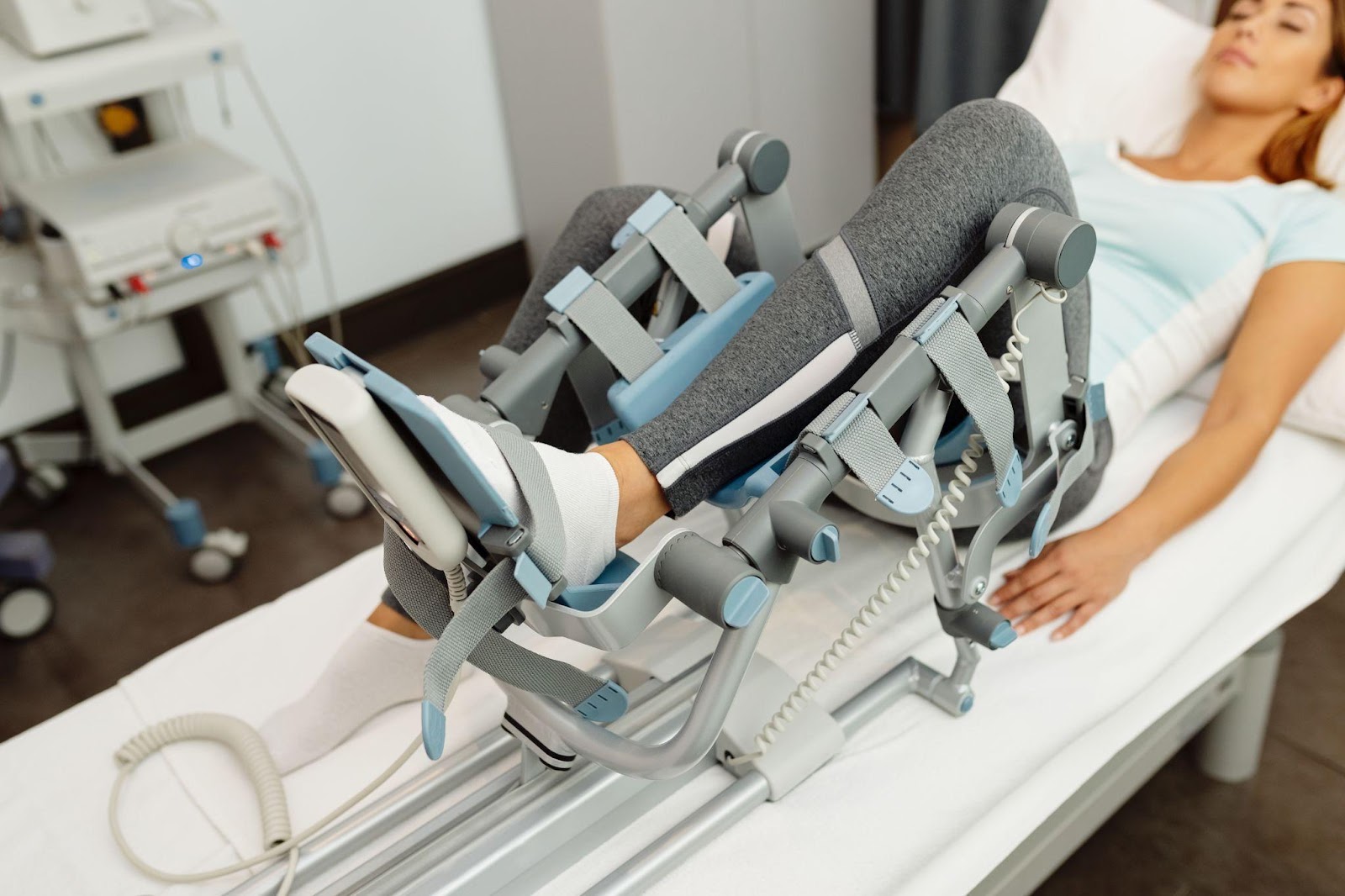
Post-accident rehabilitation and therapy options play a crucial role in helping individuals regain their health, mobility, and independence after an accident.
In Alabama, various rehabilitation programs and therapy options are available to support accident victims through their recovery journey.
Here, our Alabama personal injury attorneys will explore the different types of rehabilitation and therapy, their benefits, and how to choose the right options for your specific needs.
Types of Post-Accident Rehabilitation and Therapy
Post-accident rehabilitation and therapy encompass a wide range of treatments designed to address physical, cognitive, and emotional challenges resulting from an accident.
Physical Therapy
Physical therapy is a cornerstone of post-accident rehabilitation, focusing on restoring mobility, strength, and function to injured body parts.
Physical therapists use various techniques and exercises to help patients regain their ability to perform daily activities and prevent further injury.
Key components of physical therapy include:
- Range of motion exercises;
- Strength training;
- Balance and coordination exercises;
- Manual therapy techniques;
- Gait training; and
- Pain management strategies.
Physical therapy is particularly beneficial for individuals recovering from fractures, sprains, soft tissue injuries, and orthopedic surgeries.
Occupational Therapy
Occupational therapy aims to help individuals regain independence in their daily activities, both at home and in the workplace.
Occupational therapists work with patients to develop strategies for performing tasks that may have become challenging due to injuries sustained in an accident.
Areas addressed by occupational therapy include:
- Self-care activities (dressing, bathing, grooming);
- Home management tasks;
- Work-related skills;
- Adaptive equipment recommendations; and
- Cognitive retraining.
Occupational therapy is especially valuable for those who have experienced traumatic brain injuries, spinal cord injuries, or other conditions that affect their ability to perform everyday tasks.
Speech and Language Therapy
For individuals who have suffered injuries affecting their speech, language, or swallowing abilities, speech and language therapy can be crucial.
This type of therapy is often necessary for those who have experienced traumatic brain injuries, strokes, or facial injuries.
Speech and language therapy may focus on:
- Articulation and pronunciation;
- Language comprehension and expression;
- Voice disorders;
- Swallowing difficulties; and
- Cognitive-communication disorders.
Ultimately, speech and language therapy helps individuals recover communication skills after injuries like brain trauma or stroke. Therapists address issues like difficulty speaking, understanding language, swallowing, and cognitive communication.
Cognitive Rehabilitation
Cognitive rehabilitation is designed to address cognitive impairments resulting from traumatic brain injuries or other neurological conditions.
This type of therapy helps individuals improve their memory, attention, problem-solving skills, and executive functioning.
Cognitive rehabilitation may include:
- Memory exercises and strategies;
- Attention training;
- Problem-solving techniques;
- Executive function training; and
- Compensatory strategy development.
Ultimately, cognitive rehabilitation helps individuals regain mental abilities lost due to brain injuries. Through targeted exercises and strategies, it improves memory, attention, problem-solving, and overall brain function.
Psychological Therapy
The emotional and psychological impact of an accident can be significant.
Psychological therapy, including counseling and psychotherapy, can help individuals cope with anxiety, depression, post-traumatic stress disorder (PTSD), and other mental health challenges that may arise following an accident.
Psychological therapy may involve:
- Cognitive-behavioral therapy (CBT);
- Eye Movement Desensitization and Reprocessing (EMDR);
- Trauma-focused therapy;
- Stress management techniques; and
- Group therapy sessions.
Ultimately, Psychological therapy helps individuals cope with the emotional aftermath of an accident. Therapists address issues like anxiety, depression, and PTSD through techniques such as CBT, EMDR, and trauma-focused therapy.
Pain Management
Chronic pain is a common challenge for many accident victims. Pain management programs aim to help individuals manage their pain effectively and improve their quality of life.
These programs often involve a multidisciplinary approach, combining various therapies and techniques.
Pain management strategies may include:
- Medication management;
- Physical therapy exercises;
- Relaxation techniques;
- Biofeedback;
- Acupuncture; and
- Transcutaneous Electrical Nerve Stimulation (TENS).
Ultimately, pain management programs address chronic pain caused by accidents. These programs aim to reduce pain and improve overall quality of life through a combination of therapies, including medication, physical therapy, and relaxation techniques.
Aquatic Therapy
Aquatic therapy, or hydrotherapy, involves exercises performed in a pool or other water environment. This type of therapy can be particularly beneficial for individuals with mobility issues, as the buoyancy of water reduces stress on joints and muscles.
Benefits of aquatic therapy include:
- Improved circulation;
- Increased range of motion;
- Reduced pain and swelling;
- Enhanced muscle strength and endurance; and
- Improved balance and coordination.
Aquatic therapy uses water’s buoyancy to ease joint pain and improve mobility. This therapy helps strengthen muscles, increase range of motion, and enhance balance and coordination, making it ideal for individuals with physical limitations.
Vocational Rehabilitation
Vocational rehabilitation can be crucial for individuals whose injuries have affected their ability to work. This type of rehabilitation focuses on helping people return to work or find new employment opportunities that accommodate their current abilities.
Vocational rehabilitation services may include:
- Job skills assessment;
- Career counseling;
- Job placement assistance;
- Workplace accommodations; and
- On-the-job training.
There are numerous rehabilitation and therapy options available, each playing a crucial role in the recovery process. The right combination of these therapies can significantly improve your chances of a full and speedy recovery.
The Rehabilitation Process
Understanding the rehabilitation process can help individuals and their families navigate the journey to recovery more effectively.
The rehabilitation process typically involves several stages, each playing a crucial role in the overall recovery.
- Assessment: The rehabilitation process begins with a comprehensive assessment of the individual’s injuries, functional abilities, and overall health status. This assessment helps healthcare professionals develop a personalized treatment plan tailored to the patient’s specific needs and goals.
- Goal Setting: Based on the initial assessment, the rehabilitation team works with the patient to establish realistic and achievable goals. These goals may include both short-term and long-term objectives, focusing on improving physical function, cognitive abilities, and overall quality of life.
- Treatment Implementation: Once goals are established, the rehabilitation team implements the personalized treatment plan. This may involve a combination of therapies and interventions, as discussed in the previous section. The treatment plan is regularly reviewed and adjusted as needed to ensure optimal progress.
- Progress Monitoring: Throughout the rehabilitation process, healthcare professionals regularly monitor the patient’s progress. This may involve reassessments, functional tests, and ongoing communication with the patient and their family. Progress monitoring allows for timely adjustments to the treatment plan if necessary.
- Education and Training: An essential component of rehabilitation is educating patients and their families about the injury, recovery process, and self-management strategies. This education empowers individuals to take an active role in their recovery and helps prevent complications or setbacks.
- Transition Planning: As the patient progresses through rehabilitation, the focus shifts to planning for the transition back to home, work, or community life. This may involve home assessments, workplace modifications, or referrals to community support services.
- Follow-up Care: After the initial rehabilitation period, ongoing follow-up care is often necessary to maintain progress and address any new challenges that may arise. This may include periodic check-ups, maintenance therapy sessions, or adjustments to home exercise programs.
By understanding these stages of the rehabilitation process, you can better prepare for your recovery journey and actively participate in your treatment plan. Remember, rehabilitation is a collaborative effort between you and your healthcare team.
Frequently Asked Questions
To address common concerns and provide additional clarity, here are answers to some frequently asked questions about post-accident rehabilitation and therapy options in Alabama.
How Long Does Post-Accident Rehabilitation Typically Last?
The duration of rehabilitation varies greatly depending on the type and severity of injuries, as well as individual factors.
Some people may require only a few weeks of therapy, while others may need ongoing rehabilitation for months or even years. Your healthcare team will provide a more accurate timeline based on your specific situation.
Will Insurance Cover My Rehabilitation Expenses?
Most health insurance plans, including those in Alabama, cover some form of rehabilitation services. However, coverage can vary widely between policies.
It’s important to review your insurance policy or speak with your insurance provider to understand what services are covered, any limitations on coverage, and potential out-of-pocket expenses.
Can I Choose My Own Rehabilitation Provider?
In many cases, you have the right to choose your rehabilitation provider. However, your insurance plan may have a network of preferred providers, and choosing an out-of-network provider could result in higher out-of-pocket costs.
Discuss your options with your insurance company and healthcare team to make an informed decision.
What If I’m Not Seeing Progress in My Rehabilitation?
If you feel that you’re not making progress in your rehabilitation, it’s important to communicate your concerns to your healthcare team.
They may need to reassess your condition, adjust your treatment plan, or explore alternative therapies. Remember that recovery can be a slow process, and progress may not always be linear.
Is Home-Based Rehabilitation an Option?
Home-based rehabilitation can be an option for some individuals, especially as they progress in their recovery.
This may involve a combination of home exercises, visits from therapists, and the use of telehealth services.
Discuss the possibility of home-based rehabilitation with your healthcare team to determine if it’s appropriate for your situation.
The Next Step in Your Recovery Journey
Now that you have a comprehensive understanding of post-accident rehabilitation and therapy options in Alabama, it’s time to take action toward recovery.
At Baxley Maniscalco, we’re committed to supporting you through every step of your rehabilitation journey.
Don’t let uncertainty hold you back from reclaiming your health and independence. Contact Baxley Maniscalco today to schedule a free personal injury consultation and learn how we can assist you in your post-accident rehabilitation process.
Can't find what you're looking for? Search our site below.










